
The International Criminal Tribunal for Rwanda was an international court established in November 1994 by the United Nations Security Council in Resolution 955 in order to adjudicate people charged for the Rwandan genocide and other serious violations of international law in Rwanda, or by Rwandan citizens in nearby states, between 1 January and 31 December 1994. The court eventually convicted 61 individuals and acquitted 14.

The Kikuyu are a Bantu ethnic group native to East Africa Central Kenya. At a population of 8,148,668 as of 2019, they account for 17.13% of the total population of Kenya, making them Kenya's largest ethnic group.
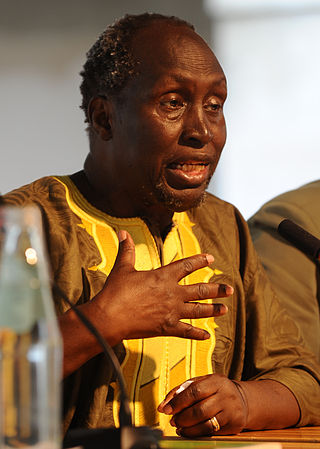
Ngũgĩ wa Thiong'o is a Kenyan author and academic, who has been described as "East Africa's leading novelist". He began writing in English, switching to write primarily in Gikuyu. His work includes novels, plays, short stories, and essays, ranging from literary and social criticism to children's literature. He is the founder and editor of the Gikuyu-language journal Mũtĩiri. His short story The Upright Revolution: Or Why Humans Walk Upright has been translated into 100 languages.
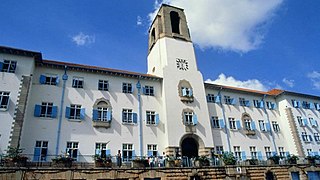
Makerere University is Uganda's largest and oldest institution of higher learning, first established as a technical school in 1922, and the oldest currently active university in East Africa. It became an independent national university in 1970. Today, Makerere University is composed of nine colleges and one school, offering programmes for about 36,000 undergraduates and 4,000 postgraduates. These colleges include College of Natural Sciences (CONAS), College of Health Sciences (CHS), College of Engineering Art & Design (CEDAT), College of Agriculture and Environmental Studies (CAES), College Of Business and Management Sciences (CoBAMS), College of Humanities & Social Sciences (CHUSS), College of Computing and Information Sciences (COCIS), College of Veterinary Medicine, Animal Resources & Bio-security (COVAB), College of Education and External Studies (CEES) and Makerere University Business School (MUBS). In addition, Makerere has onother campus in Eastern Uganda Jinja City.

Peter Nazareth is a Ugandan literary critic and writer of fiction and drama.

Mũkoma wa Ngũgĩ is a Kenyan American poet, author, and academic. He is associate professor of literatures in English at Cornell University and co-founder of the Safal-Cornell Kiswahili Prize for African Writing. His father is the author Ngũgĩ wa Thiong'o. His family was deeply impacted by the bloody British suppression of the Mau Mau revolution.
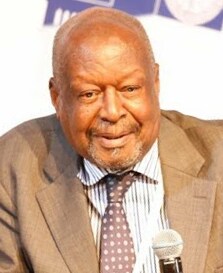
John Mwesigwa Robin Nagenda was a Ugandan writer, political figure, and sportsman. In the 1960s, he pioneered post-colonial English literature in East Africa. He lived in exile in the United Kingdom in the 1970s and 1980s before returning to Uganda in 1986. He subsequently became a senior advisor to President Yoweri Museveni and a prominent newspaper columnist. He represented East Africa at the 1975 Cricket World Cup and was later president of the Uganda Cricket Association.

Petals of Blood is a novel written by Ngũgĩ wa Thiong'o and first published in 1977. Set in Kenya just after independence, the story follows four characters – Munira, Abdulla, Wanja, and Karega – whose lives are intertwined due to the Mau Mau rebellion. In order to escape city life, each retreats to the small, pastoral village of Ilmorog. As the novel progresses, the characters deal with the repercussions of the Mau Mau rebellion as well as with a new, rapidly westernizing Kenya.
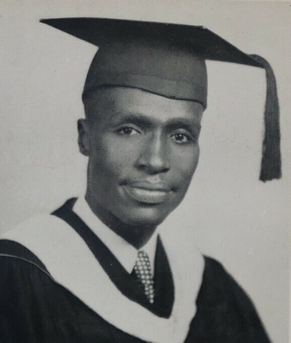
Reuel John Mugo Gatheru was a Kenyan writer known for his 1964 memoir, Child of Two Worlds, which describes his early life in Kenya and his education abroad.

Zukiswa Wanner is a South African journalist, novelist and editor born in Zambia and now based in Kenya. Since 2006, when she published her first book, her novels have been shortlisted for awards including the South African Literary Awards (SALA) and the Commonwealth Writers' Prize. In 2015, she won the K Sello Duiker Memorial Literary Award for London Cape Town Joburg (2014). In 2014, Wanner was named on the Africa39 list of 39 Sub-Saharan African writers aged under 40 with potential and talent to define trends in African literature.
Kenyan crime fiction is a genre of crime fiction that is set in the country of Kenya, and usually written by Kenyan authors. According to G.J. Demko of Dartmouth College, "The fundamental premise of all [crime fiction] is a society that is ordered and real but becomes disordered as a result of a crime imposed on that society. In the normal case, a hero arrives - an officer of the law, a private detective or an amateur sleuth - and via logical deduction, hard work or luck, solves the crime, identifies the perpetrator, and order is restored." However, Kenyan crime fiction differs slightly from Demko's definition because of the following reasons: crime is often so pervasive in societies portrayed in Kenyan crime novels that it becomes almost a part of the order, and many times crimes are not conclusively solved by the end of the stories, mimicking the real-life cyclical nature of crime.

Black Star Nairobi is a Kenyan crime fiction novel written by Mukoma wa Ngugi, the son of Kenyan novelist Ngugi wa Thiong’o. The novel was published by Melville House International in 2013; it is a sequel to Mukoma's first novel, Nairobi Heat.Black Star Nairobi focuses on two detectives who investigate a hotel bombing and a murder that are linked. The novel's backdrop is the 2007 presidential elections in Kenya, which ended in violence.
Britam Holding PLC is a leading diversified financial services group and is listed on the Nairobi Securities Exchange. The group has presence in seven Africa countries in Kenya, Uganda, Tanzania, Rwanda, South Sudan, Mozambique and Malawi.

Decolonising the Mind: the Politics of Language in African Literature, by the Kenyan novelist and post-colonial theorist Ngũgĩ wa Thiong'o, is a collection of essays about language and its constructive role in national culture, history, and identity. The book, which advocates linguistic decolonization, is one of Ngũgĩ's best-known and most-cited non-fiction publications, helping to cement him as a preeminent voice theorizing the "language debate" in post-colonial studies.
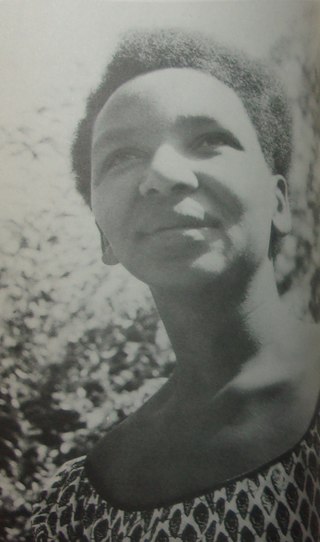
Rebeka Njau was Kenya's first female playwright and a pioneer in the representation of African women in literature. Her writing has addressed topics such as female genital mutilation and homosexuality. Her first novel, Ripples in the Pool (1975), appeared as number 203 in the Heinemann African Writers Series.

Paul Kipchumba, in Chinese Chen Pu (陈朴), is a Kenyan author, businessman and philanthropist from Elgeyo-Marakwet County, Kenya. His other names are Kipwendui and Kibiwott. He speaks Chinese, English, Marakwet, and Swahili. Magical Kenya News called Kipchumba one of the best Kenyan writers of all time.

The presidency of Daniel arap Moi began on 22 August 1978, when Daniel arap Moi was sworn in as the 2nd President of Kenya, and ended on 30 December 2002. Moi, a KANU party member, took office following the death of the then president Jomo Kenyatta on the same day. He was sworn as interim president for 90 days during which the country was to prepare for a presidential election to be held on 8 November. Moi won reelections in 1988, 1992 and 1997, defeating Mwai Kibaki in the latter two elections. He was succeeded by Mwai Kibaki in 2002. He died at the age of 95 on 4 February 2020
Wanjikũ wa Ngũgĩ is a Kenyan writer, who has lived and worked in Eritrea, Zimbabwe and Finland. She is the founder and former director of the Helsinki African Film Festival (HAFF). Also a political analyst, she is a member of the editorial board of Matatu: Journal for African Literature and Culture and Society, and has been a columnist for the Finnish development magazine Maailman Kuvalehti. Among journals and newspapers in which her work has appeared are The Herald (Zimbabwe), The Daily Nation, Business Daily, Pambazuka News and Chimurenga. She is the author of a novel published in 2014 and a contributor to anthologies including New Daughters of Africa: An International Anthology of Writing by Women of African Descent, Nairobi Noir.

The 2021 Nobel Prize in Literature was awarded to the Tanzanian-born British novelist Abdulrazak Gurnah who the Swedish Academy members praised "for his uncompromising and compassionate penetration of the effects of colonialism and the fate of the refugee in the gulf between cultures and continents." The winner was announced on October 7, 2021, by Mats Malm, permanent secretary of the Swedish Academy.
















